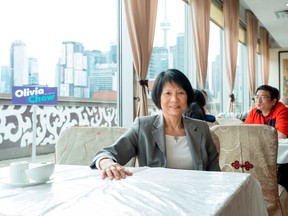On Monday, Toronto voters will have the chance to elect a mayor who can save the city from the same spiral of decay and despair that’s claimed cities like San Francisco and Seattle. That mayor is not Olivia Chow.
Politics
Sabrina Maddeaux: Olivia Chow — a regressive politician who will oversee Toronto’s downfall

Doom loops — a phenomenon where one problem worsens others, which in turn worsen the first, spurring a perpetual cycle of decline — are taking hold of urban centres across the United States. With its multitude of interconnected crises — from housing affordability to crime, a wholly insufficient transit system, brain drain and a downtown core that hasn’t recovered from the pandemic — Toronto risks joining them.
Notably, cities in doom loops have something in common: a history of rigidly “progressive” mayors whose ideological puritanism rendered them incapable of responding to key issues.
This mentality afflicts politicians on both sides of the aisle, but can be more insidious on the left because of the enduring stereotype that leftists are inherently progressive. This fallacy has delayed much-needed introspection, modernization and reform on the left.
Both San Francisco and Seattle suffered from years of local rule by mayors and councillors determined to stick out archaic progressive attitudes and policies that clearly weren’t working.
Drug use and crime were allowed to proliferate. Preventing homelessness took a back seat to efforts to make unhoused people’s lives marginally better — even as they often got demonstrably worse — at greater and greater cost to taxpayers, and homeless populations exploded.
As a result, young professionals and middle-class families fled to greener pastures, leaving behind gaping wealth gaps. Offices were vacated, businesses big and small shuttered, transit deteriorated and essential workers like nurses, teachers and police were nowhere to be found. This led to even larger exoduses, which once again made things worse.
Olivia Chow has made it clear that she will follow in the same footsteps as the doomed mayors of San Francisco and Seattle. She, too, fails to understand that affordable housing, while important, will never be enough without housing affordability.
She, too, fails to acknowledge that law enforcement must play a role in tackling increasingly open drug use and random acts of crime.
Polls have her gliding to victory based mostly on name recognition and a decades-old personal brand with strong leftist vibes. However, these vibes obfuscate a politician whose views are steeped in old-school ideology rather than modern reality.
If Toronto is to avoid its own doom loop, we can’t simply spin in the same place — or, worse, backwards — led by a retrograde mayor disguised as a champion for change.

Politics
NDP caving to Poilievre on carbon price, has no idea how to fight climate change: PM

OTTAWA – Prime Minister Justin Trudeau says the NDP is caving to political pressure from Conservative Leader Pierre Poilievre when it comes to their stance on the consumer carbon price.
Trudeau says he believes Jagmeet Singh and the NDP care about the environment, but it’s “increasingly obvious” that they have “no idea” what to do about climate change.
On Thursday, Singh said the NDP is working on a plan that wouldn’t put the burden of fighting climate change on the backs of workers, but wouldn’t say if that plan would include a consumer carbon price.
Singh’s noncommittal position comes as the NDP tries to frame itself as a credible alternative to the Conservatives in the next federal election.
Poilievre responded to that by releasing a video, pointing out that the NDP has voted time and again in favour of the Liberals’ carbon price.
British Columbia Premier David Eby also changed his tune on Thursday, promising that a re-elected NDP government would scrap the long-standing carbon tax and shift the burden to “big polluters,” if the federal government dropped its requirements.
This report by The Canadian Press was first published Sept. 13, 2024.
The Canadian Press. All rights reserved.
Politics
Quebec consumer rights bill to regulate how merchants can ask for tips

Quebec wants to curb excessive tipping.
Simon Jolin-Barrette, minister responsible for consumer protection, has tabled a bill to force merchants to calculate tips based on the price before tax.
That means on a restaurant bill of $100, suggested tips would be calculated based on $100, not on $114.98 after provincial and federal sales taxes are added.
The bill would also increase the rebate offered to consumers when the price of an item at the cash register is higher than the shelf price, to $15 from $10.
And it would force grocery stores offering a discounted price for several items to clearly list the unit price as well.
Businesses would also have to indicate whether taxes will be added to the price of food products.
This report by The Canadian Press was first published Sept. 12, 2024.
The Canadian Press. All rights reserved.
Politics
Youri Chassin quits CAQ to sit as Independent, second member to leave this month

Quebec legislature member Youri Chassin has announced he’s leaving the Coalition Avenir Québec government to sit as an Independent.
He announced the decision shortly after writing an open letter criticizing Premier François Legault’s government for abandoning its principles of smaller government.
In the letter published in Le Journal de Montréal and Le Journal de Québec, Chassin accused the party of falling back on what he called the old formula of throwing money at problems instead of looking to do things differently.
Chassin says public services are more fragile than ever, despite rising spending that pushed the province to a record $11-billion deficit projected in the last budget.
He is the second CAQ member to leave the party in a little more than one week, after economy and energy minister Pierre Fitzgibbon announced Sept. 4 he would leave because he lost motivation to do his job.
Chassin says he has no intention of joining another party and will instead sit as an Independent until the end of his term.
He has represented the Saint-Jérôme riding since the CAQ rose to power in 2018, but has not served in cabinet.
This report by The Canadian Press was first published Sept. 12, 2024.
The Canadian Press. All rights reserved.
-

 News10 hours ago
News10 hours agok.d. lang gets the band back together for Canadian country music awards show
-

 News10 hours ago
News10 hours agoNATO military committee chair, others back Ukraine’s use of long range weapons to hit Russia
-

 Sports10 hours ago
Sports10 hours agoCavaliers and free agent forward Isaac Okoro agree to 3-year, $38 million deal, AP source says
-

 News10 hours ago
News10 hours agoLiverpool ‘not good enough’ says Arne Slot after shock loss against Nottingham Forest
-

 News10 hours ago
News10 hours ago‘Challenges every single muscle’: Champion tree climber turns work into passion
-

 News10 hours ago
News10 hours agoMPs to face new political realities on their return to Ottawa
-

 News10 hours ago
News10 hours agoAir Canada, pilots still far apart as strike notice deadline approaches
-

 News10 hours ago
News10 hours agoToronto police investigating fatal stabbing in the city’s west end as homicide




























